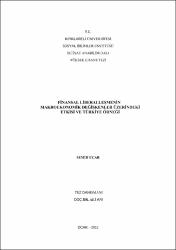| dc.contributor.author | Uçar, Semih | |
| dc.date | 2019-04-08 | |
| dc.date.accessioned | 2019-04-08T14:02:33Z | |
| dc.date.available | 2019-04-08T14:02:33Z | |
| dc.date.issued | 2016-01 | |
| dc.identifier.citation | Uçar, S. (2016). Finansal liberalleşmenin makroekonomik değişkenler üzerindeki etkisi ve Türkiye örneği. Kırklareli Üniversitesi Sosyal Bilimler Enstitüsü , Kırklareli | |
| dc.identifier.uri | https://hdl.handle.net/20.500.11857/724 | |
| dc.description.abstract | Teorik temelleri uzunca bir geçmişe sahip olan finansal liberalleşme düşüncesi, 1970'lerin başında Bretton Woods sisteminin yıkılması sonucunda gelişmiş ülkelerde yayılmaya başlamıştır. 1980'lerin başından itibaren teorik temellerini Neo-liberal politikalardan alan finansal liberalleşme teorisi McKinnon-Shaw hipotezine dayandırılarak gelişmekte olan ülkelere yayılmıştır. 1980'lerin ikinci yarısı ve 1990'lı yıllar da tüm dünyaya yayılan finansal liberalleşme uygulamaları, bu sürece ayak uydurmak ve finansal bütünleşmenin getireceği faydalardan yararlanmak isteyen bazı ülkelerde olumlu sonuç verirken, birçok ülkede üstesinden gelinemeyecek sosyal maliyeti yüksek krizlere sebep olmuştur. 24 Ocak 1980 Kararları ile Türkiye ile buluşan finansal liberalleşme uygulamaları, bu doğrultuda Türkiye ekonomisinde birçok reformun uygulanmasına neden olmuştur. 1989 yılında 32 Sayılı Karar ile birlikte dış finansal liberalleşmeye geçilmesinin ardından günümüze kadar geçen sürede birçok gelişmekte olan ülke ekonomisinde olduğu gibi Türkiye ekonomisi de pek çok istikrarsızlık ve iktisadi kriz ile karşı karşıya kalmıştır. Çalışmamızın amacı, finansal liberalleşme uygulamalarının nasıl ortaya çıktığı ve süreç içerisinde nasıl tüm dünyaya yayıldığını ve ayrıca Türkiye ekonomisinde, 1980 sonrası dönemde uygulanan finansal liberalleşme uygulamalarının makroekonomik değişkenler üzerindeki etkilerini analiz etmektir. | |
| dc.description.abstract | The idea of financial liberalization which has historical theoretical roots began to spread in developing countries as a result of the collapse of the BrettonWoods system in early 1970s. During 1980s, this neo-liberal process compeletely settled in developing countries on the basis of Mckinnon-Shaw hypothesis.Financial liberalization practices brought some positive results to some countries, while many other countries suffered severe crises with very high economic and social costs. Financial liberalization practices emerged in Turkey with the reform package implemented on 24th January 1980. This process led to many structural reforms in the Turkish economy. In accordance with the law no. 32 in 1989, external financial liberalization was assimilated in Turkey. Since then, like many other developing economies, the Turkish economy faced many instabilities and crises. The purpose of our study is to analyze how financial liberalization practices came about and how it spread around the world. Another purpose of this study is to analyze the impacts of the financial liberalization over the macroeconomic variables in Turkey after 1980s. | |
| dc.language.iso | tur | |
| dc.publisher | Kırklareli Üniversitesi Sosyal Bilimler Enstitüsü | |
| dc.rights | info:eu-repo/semantics/openAccess | |
| dc.rights.uri | http://creativecommons.org/licenses/by-nc-nd/3.0/us/ | * |
| dc.subject | Liberalleşme | |
| dc.subject | Finansal Liberalleşme | |
| dc.subject | Türkiye Ekonomisi ve Makroekonomik Değişkenler | |
| dc.subject | Liberalization | |
| dc.subject | Financial Liberalization | |
| dc.subject | Turkish Economy and Macroeconomic Variables | |
| dc.title | Finansal Liberalleşmenin Makroekonomik Değişkenler Üzerindeki Etkisi ve Türkiye Örneği | |
| dc.title.alternative | Financial Liberalization in the Macro–Economic Variables and the Effect on the Example of Turkey | |
| dc.type | masterThesis | |
| dc.department | [KLÜ] | |
| dc.relation.publicationcategory | Tez | |





















